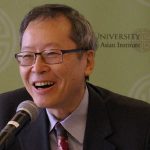
Haruo Shirane teaches Japanese literature and cultural history, with particular focus on prose fiction, poetry, performative genres, and visual culture. He is currently interested in the relationship of classical and medieval cultures to early modern and contemporary cultures, looking at issues of gender, manuscript culture, print capitalism, performance and media. He is currently finishing a book called Media, Performance, and Popular Culture: De-Centering Japanese Literature, which recontextualizes Japanese literature in a broader comparative context, focusing on the role of material culture, media, orality, and performance. His most recent book, Japan and the Culture of the Four Seasons (Columbia University Press), explored the cultural construction of nature and the environment across a wide spectrum of literature, media, and visual arts from the ancient period to the modern.
Professor Shirane has also edited a book on Japanese poetry called Waka Opening Up to the World: Language, Community, and Gender (Benseisha, 2012), a bilingual (Japanese-English) edition that brings together the best scholarship in both Japanese and English on the function and impact of Japan’s most influential poetic genre.
Professor Shirane is also engaged in bringing new approaches to the study of Japanese literary culture. This has resulted in Japanese Literature and Literary Theory (Nihon bungaku kara no hihyō riron, Kasama shoin, 2009), edited with Fujii Sadakazu and Matsui Kenji; and New Horizons in Japanese Literary Studies (Bensei Publishing, 2009), both of which explore new issues and methodologies in the study of print and literary culture.
Professor Shirane is also the editor of Food in Japanese Literature (Shibundō, 2008); Overseas Studies on The Tale of Genji (Ōfū, 2008); and Envisioning The Tale of Genji: Media, Gender, and Cultural Production (Columbia University Press,2008). The latter two books analyze the impact of The Tale of Genji on Japanese cultural history in multiple genres and historical periods.He has translated and edited a numberof volumes on Japanese literature. These include The Demon at Agi Bridge and Other Japanese Tales (Columbia University Press, 2010), a collection of setsuwa (anecdotal literature); Classical Japanese Literature, An Anthology: Beginnings to 1600 (Columbia University Press,2006); Early Modern Japanese Literature: An Anthology, 1600–1900 (Columbia University Press, 2002; abridged ed.,2008); and The Tales of the Heike (Columbia University Press, 2006, paperback 2008).
Professor Shirane is also deeply involved with the history of Japanese language and pedagogical needs and has written the Classical Japanese Reader and Essential Dictionary (2007) and Classical Japanese: A Grammar (Columbia University Press,2005). Previous books include Traces of Dreams: Landscape, Cultural Memory, and the Poetry of Bashō (Stanford University Press, 1998) and The Bridge of Dreams: A Poetics of The Tale of Genji (Stanford University Press, 1987). He also is coeditor with Tomi Suzuki of Inventing the Classics: Modernity, National Identity, and Japanese Literature (Stanford University Press, 2001).
Professor Shirane received his BA from Columbia College (1974) and his PhD from Columbia University (1983). He is the recipient of Fulbright, Japan Foundation, SSRC, and NEH grants and has been awarded the Kadokawa Genyoshi Prize, Ishida Hakyō Prize, and, most recently, the Ueno Satsuki Memorial prize (2010) for outstanding research on Japanese culture.


